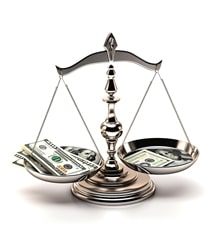What are the Wage Garnishment Laws in Illinois?
Updated on 20 May 2025
Having wages garnished can be devastating. In this tough economy, many people are struggling to meet their basic living expenses and simply don’t have enough
income left over to pay off their debts. Creditors typically use wage garnishment in Illinois as a final attempt to collect outstanding debts. During this process,
you can no longer decide how to spend your hard earned pay, and your employer becomes involved in your financial hardships. Of course, you’re better off avoiding
garnishment by settling your debt before a court issues garnishment order. If this is not possible, however, you have other rights and options.
Tips to avoid garnishment
If you fall behind on your payments, contact your creditor to make alternative payment arrangements. Also, be sure to respond to any court notices in order to preserve your rights.
How creditors initiate garnishment
In most instances, a creditor must obtain a court order to initiate
wage garnishment.
The order forces your employer to withhold a specific amount from your paycheck to pay on your debt. Consumer creditors, including medical creditors, credit cards and
banks, must first sue you in court and obtain a judgment against you before they can garnish your wages. However, some exceptions apply and your wages may be garnished
without a judgment to pay:
- student loans debt in default status
- court-ordered child support payments
- child support arrears
- unpaid income taxes
Wages and amounts subject to garnishment
Illinois law provides various wage deduction rules based on the types of debt and the law also places limits on the amount your employer can deduct your paycheck to
pay creditors. For example, you are permitted to keep $371.25 weekly or $1608.75 monthly (calculated after taxes are deducted). Consumer creditors may not seek
wage garnishment in Illinois if you earn less. If you earn more than the exempt amount then your employer can deduct
the lesser of 15% of your gross wages (before tax deductions) or the amount of your take home pay that is over the exempt amount.
In addition, certain income is exempt from
garnishment, including pensions or retirement funds, social security, unemployment, alimony and others.
Bankruptcy can either prevent or remove a garnishment from your check, sparing you from embarrassment and inconvenience. Contact the bankruptcy lawyers at
DebtStoppers, Bankruptcy Law Firm for a free consultation.
Understanding Wage Garnishment Exemptions
It is essential to be aware of the exemptions that protect you from wage garnishment in Illinois. Some income sources are exempt from garnishment, ensuring you have a financial safety net. Social security benefits, for example, are typically protected from garnishment by creditors. However, there are exceptions in cases of child support, alimony, or federal debts such as taxes or student loans. Knowing your rights and the exemptions applicable to your income can help you better navigate your financial situation.
Wage Garnishment After Paid in Full
Once a debt is paid in full, the wage garnishment associated with it should cease. It is the creditor's responsibility to inform the court and your employer that the garnishment should be terminated. However, mistakes can happen, and sometimes garnishments may continue even after the debt has been settled. In such cases, it is crucial to communicate with your creditor, the court, and your employer to rectify the situation and ensure that the garnishment stops as soon as possible.
Stopping Wage Garnishment Through Bankruptcy
Filing for bankruptcy can be an effective way to stop wage garnishment. When you file for bankruptcy, an automatic stay is put into place, which temporarily halts most collection activities, including wage garnishments. This stay provides you with breathing room to reorganize your finances and address your debts. In a Chapter 7 bankruptcy, many unsecured debts can be discharged, eliminating the need for wage garnishment. In a Chapter 13 bankruptcy, you will establish a repayment plan that allows you to pay off your debts over time, typically without the need for wage garnishment.
Seek Professional Help
Wage garnishment can be a stressful and challenging situation to handle on your own. If you are facing wage garnishment or struggling with debt, it is advisable to consult with an experienced bankruptcy attorney. They can help you understand your rights, explore your options, and guide you through the process of addressing your financial difficulties. Don't hesitate to reach out to a knowledgeable legal professional who can help you regain control of your financial future.


